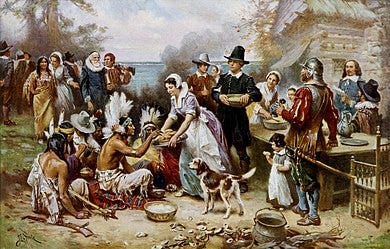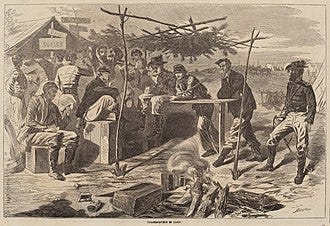The Story of Thanksgiving As a Story
Why Do We Remember The Pilgrims?
It's Thanksgiving Day in the United States this coming week. According to the traditional story most Americans know, Thanksgiving commemorates the "first Thanksgiving" of the Pilgrim settlers in Plymouth colony. After several early hard years of struggle and plague and shortage, they finally (with help from the local Indians) enjoyed a good harvest, and - together with the Indians - had a feast in thanks to God. Thanksgiving commemorates that feast and its spirit of gratitude and peace. Just about every American has heard a version of this story, and we might also have heard other details.
Officially, our modern Thanksgiving Day never had any official ties to this; other "days of thanksgiving" were proclaimed over the years for other later things - whether other good harvests or end of strife or military victories. Even the first official annual Thanksgiving in 1863 was proclaimed by President Lincoln thanks to contemporary events like victories in the Civil War.
But, the tradition of the Pilgrims' Thanksgiving has sustained itself in our national memory. Children's textbooks have even called them "the Pilgrim Fathers." And calling them "fathers" isn't wrong; they did give rise to a significant part of our nation and national character.
Still, they weren't the first successful settlers in the land that would become the United States; those were the Indians. They weren't the first European settlers either; those were the Spanish at Santa Fe (who'd come north from Mexico). They weren't even the first English settlers; those were the adventurers at Jamestown - and though Jamestown itself got destroyed, their later settlement next-door at Williamsburg survives to this day. One story of Jamestown, at least, John Smith being saved by Pocahontas, has survived into our national memory. Jamestown occasionally gets mentioned, like in President Kennedy's Thanksgiving address referring back to "our forefathers in Virginia and in Massachusetts." But Plymouth is so much more prominent. Despite Kennedy, everyone who thinks of Thanksgiving will remember Plymouth not Jamestown. Why? Why do we commemorate Plymouth every year with a story, but rarely mention Jamestown?
Historically, the annual Thanksgiving holiday arose from an 1840's social movement in the northern United States, to give thanks to God and to tie together the United States. Plymouth and the Pilgrims weren't mentioned then, or when President Lincoln proclaimed the first annual Thanksgiving in November, or when President Grant officially made it annual.
In Lincoln and Grant's day, there was a lot of story for Thanksgiving in their messages. As Lincoln put it in his late-1863 Thanksgiving proclamation:
In the midst of a civil war of unequaled magnitude and severity, which has sometimes seemed to foreign States to invite and to provoke their aggression, peace has been preserved with all nations, the order has been maintained, the laws have been respected and obeyed, and harmony has prevailed everywhere except in the theatre of military conflict; while that theatre has been greatly contracted by the advancing armies and navies of the Union.
But when the story of the Civil War became mere history rather than a recent experience - something where people commemorated dead soldiers on the new Memorial Day holiday rather than gave thanks for triumphs - Americans needed a different story to associate with Thanksgiving.
I'm not sure when Thanksgiving became firmly associated with the Pilgrims, but by the 1890's, schools were regularly hosting Thanksgiving pageants about the Pilgrims. I can guess why the connection spread. The Pilgrims' story makes sense as a story. Our protagonists (the Pilgrims) are looking for freedom (a very sympathetic motive), which brings them to America after they can't find it elsewhere (playing into America's longstanding self-identity as a land of liberty and haven for the oppressed). Their first task in America is to frame a new government for themselves (also playing to America's self-identity). They struggle to learn how to live in the new world (in engaging ways if you go into the details, and echoing later Americans' own struggles), but they persevere. With help from their new friends the American Indians they finally reach prosperity - and together with the Indians have a big feast, the first Thanksgiving.
I've abridged the story a lot, of course. On the one hand, there're a lot more details I could put in (like the passage where Bradford writes of their compassion caring for each other during the plagues, which my dad read us one Thanksgiving when I was young). On the other hand, there're other subplots which are held up to belie some of these main themes (like the Pilgrims' own religious persecution of dissenters, or their later wars with the American Indians). There's a lot I could say about all of these if I wanted, but that's not what I'm talking about here.
My point is that the basic short version I gave is engaging as a story, and that it appeals to Americans very well. It was a good story in the nineteenth century, and it's still a good and appealing story today. Yes, to some extent, it was consciously massaged to that purpose - but that could only be done because the core was there.

In contrast, the story of the earlier settlement at Jamestown doesn't appeal so well, and it can't be massaged into something that does. They came to America to find gold and get rich; they kept hunting for gold almost to the point of starvation, until John Smith (previously imprisoned for disrespecting the governor) came to power and made them farm for themselves; they kept fighting among themselves and with the neighboring American Indians. These people do not have sympathetic motives and do not act sympathetically. It isn't the sort of story that fits in pageants and national holidays - and on top of this, it isn't an emotionally satisfying story at all. Our protagonists don't act sympathetically, and when their story eventually gets a good ending, it's in spite of them at least as much as because of them.
We do have one charming story of Pocahontas saving Smith's life... but despite this story’s enshrinement in our national lore, it's unclear whether it even happened (Smith was thought at the time to be a braggart). Besides that, the story ignores how the colonists later kidnapped Pocahontas, and how (after her marriage to John Rolfe) she died of disease in her early twenties while visiting England. The Disney rendition even has to plant a whole earlier plot arc between Smith and Pocahontas.
I have read one attempt to massage the Jamestown story into something more fitting: in the 1959 kids' history book America Is Born. Smith is praised for his wise government of Jamestown, the story of their futile gold-hunting is summed up with the moral "if you don't succeed, try something else," and Rolfe is praised for finding a cash crop that brings Virginia to prosperity. Unfortunately, this still shows the average settler in an ill light. What's more, the modern day has a poor view of Rolfe's successful cash crop: tobacco.
So, it's no surprise that the popular story of American history has focused on the Plymouth colony instead. On the one hand, we would rather think of ourselves as the Pilgrims of Plymouth than as the Merchant Adventurers of Jamestown. They act like better people, and they act more in line with our specific self-image as Americans. (Besides, some Americans (many more in previous generations) are members of the exact same Congregational Church as the Pilgrims; Jamestown didn't leave any such organization behind it.) These are the sort of people we're proud to remember and commemorate in holidays and pageants.
And on the other hand, the story of the Pilgrims is a better story as a story. The Pilgrims, as protagonists, struggle through difficulties while trying to do the right thing until finally they overcome them through their own skill and hard work and the friends that they've won through their good qualities. This isn't just the sort of history that appeals to pageant-makers; it's the core of a good story. Being saved in spite of yourself (say, by John Smith's government and John Rolfe's tobacco) is nothing unusual in history, but to make it an attractive story, you need to change the protagonist to the people who do the saving. If we had a holiday commemorating John Rolfe... well, it would've probably perished when tobacco was found harmful.
This Thanksgiving, I expect I'll be getting together with family and friends and eating good food. But also, I expect I'll read some more about the Pilgrims and the struggles they went through. Even aside from its historical importance, it's a good story.



